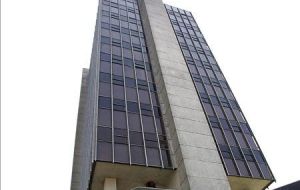MercoPress. South Atlantic News Agency
Brazilian central bank keeps benchmark interest rate on hold at 10.75%
 The central bank has helped cool the economy in an electoral year
The central bank has helped cool the economy in an electoral year Brazil's central bank held on Wednesday its benchmark interest rate at 10.75%, ending a monetary tightening cycle that helped cool the economy as the country prepares for October 3 presidential election.
Policymakers were expected to keep the so-called Selic rate at the conclusion of a two-day monetary policy meeting.
“While it does not expect the inflation rate registered in recent months to be maintained in the near future, the Copom sees the continued reduction of risks for the inflation outlook that has taken shape since its penultimate meeting” the bank's monetary policy committee, known as Copom, said in a statement.
The Copom statement said the decision was unanimous and that “holding the base interest rate at the level established in July will help ensure the convergence of inflation toward the target”.
The central bank has lifted the Selic by 200 basis points since April, when the rate stood at an all-time low of 8.75%.
But with the economy cooling from its 9% pace in the first quarter and inflation slowing, analysts see room for the bank to hold rates steady through the end of the year. However, interest rates could start climbing again in 2011.
“To bring inflation back to the centre of the target, they'll need to start the tightening process again at the start of the year,” said Jankiel Santos, chief economist for BES Investimento in Sao Paulo.
The Selic could end 2011 at 12%, he said -- still lower than the 13.75% rate as recently as last year, marking a new era for Brazilian interest rates.
Brazil shook off the global economic crisis more quickly than many developed economies, chalking up Chinese-level growth rates in the first quarter that prompted fears of overheating.
As the central bank raised interest rates and the government phased out tax breaks for key industries, the economy cooled and inflation slowed.
Lower interest rates are good news for presidential frontrunner Dilma Rousseff, the ruling party candidate in the October elections. Rousseff has a double-digit opinion poll lead over opposition contender Jose Serra, a vocal critic of the bank's decision to raise interest rates earlier this year.
Cooling activity has already crept into inflation data, with consumer prices unexpectedly falling in the month to mid-August and analysts revising down their inflation expectations for 2010 for the second straight week in a weekly central bank survey.
They now expect inflation to end the year at 5.07%, near the government target of 4.5%, plus or minus two percentage points.




Top Comments
Disclaimer & comment rulesCommenting for this story is now closed.
If you have a Facebook account, become a fan and comment on our Facebook Page!